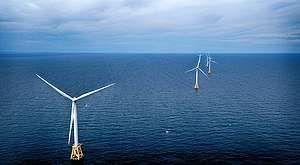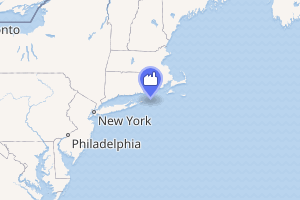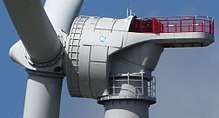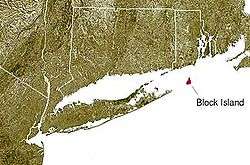Block Island Wind Farm
Block Island Wind Farm is the first commercial offshore wind farm in the United States,[5] located 3.8 miles (6.1 km) from Block Island, Rhode Island in the Atlantic Ocean. The five-turbine, 30 MW project was developed by Deepwater Wind. Construction began in 2015 and in late summer 2016 five Alstom Haliade 150-6-MW turbines were erected. Operations were launched in December 2016.[4] It is the largest project using wind power in Rhode Island.
| Block Island Wind Farm | |
|---|---|
 Aerial view | |

| |
| Country | United States |
| Location | New Shoreham, Rhode Island |
| Coordinates | 41°06′52.96″N 71°31′16.18″W |
| Status | Operational |
| Construction began | 2015 |
| Commission date | 12 December 2016[1] |
| Construction cost | $290 million |
| Owner(s) | Deepwater Wind |
| Wind farm | |
| Type | offshore |
| Distance from shore | 3.8 miles (6.1 km) |
| Hub height | 100 m[2] |
| Rotor diameter | 150 m |
| Rated wind speed | 3–25 m/s[3] |
| Power generation | |
| Units operational | 5 × 6 MW |
| Make and model | Haliade 150[4] |
| Nameplate capacity | 30 MW |
| Capacity factor | 47.6% (projected)[4] |
| Annual net output | 125 GW·h |
| External links | |
| Website | dwwind.com/project/block-island-wind-farm/ |
 | |
Design and capacity
Block Island Wind Farm is a project of Deepwater Wind[6] located about 3.3 nautical miles (6.1 km; 3.8 mi) southeast of Block Island, the first offshore wind farm in the United States.[7] The 30 megawatt, five-turbine demonstration project is expected to produce more than 125,000 megawatt hours of electricity annually. Power is transmitted from the turbines to the electric grid along a 21-mile (34 km) transmission submarine power cable buried under the ocean floor, making landfall north of Scarborough Beach in Narragansett, Rhode Island. The structures were designed by Alstom Wind, standing 600 ft high (180 m). They can withstand a Category 3 storm.[8][9][10] The system connects New Shoreham, Rhode Island to the grid for the first time and allows it to cease using diesel generators which have been replaced with power from the cable supplying the island.[11] Gulf Island Fabrication was interested in building the foundations.[12]
Permits and funding
The Block Island Wind Farm was conceived as a larger project extending into neighboring Massachusetts[13] to build a $1.5-billion, 385-megawatt wind farm in federal waters. The 100-turbine project could provide 1.3 terawatt-hours (TW·h) of electricity per year – 15 percent of all electricity used in the state.[14] In 2009, the State of Rhode Island designated Deepwater Wind to begin with pilot projects.[15][16] In that year Deepwater signed an agreement with National Grid to sell the power from the wind farm off Block Island, at an initial price of 24.4¢/kW·h,[17] with a guaranteed[18] 3.5% annual increase.[19]
The permitting process for the project has been highly controversial, with the Rhode Island Public Utilities Commission (RIPUC) initially rejecting the agreement price with National Grid as being excessive to Rhode Island's electricity rate payers.[20] However, after the Rhode Island General Assembly and Governor Carcieri changed the state law concerning the "commercial reasonability" of contract pricing, the RIPUC voted to approve the key contract.[21] After continuing controversy and appeals, the Rhode Island Supreme Court ruled in July 2011 to uphold the RIPUC decision. Opponents of the project raised issue about the contract pricing with the United States Federal Energy Regulatory Commission (FERC) in August 2012, but FERC in October of the same year issued a decision that they would not act on the complaint.[22] A total of nine reviews and permits from state federal agencies were acquired, the last in early May 2015.[23] On May 11, 2015 a new complaint was filed with FERC alleging that the power purchase agreement with National Grid violates the Public Utilities Regulatory Policy Act of 1978 and further alleging that the RIPUC violated the Federal Power Act and the Supremacy Clause of the U.S. Constitution. However, Deepwater Wind maintains that there is no support for any of these claims and that FERC should promptly deny the new complaint in its entirety.[22]
While the wind turbines have been built in state waters southeast of Block Island, the transmission cable crosses federal waters in the Atlantic. A portion of the power is supplied directly to Block Island which is 13 miles (21 km) off shore from the Rhode Island mainland and had some of the highest power rates in the country due to its local generation by small diesel powered generators.[24][25][26]
Deepwater Wind announced March 2015 that it had received funding in the amount of $290 million from mandated lead arrangers Société Générale of Paris, France and KeyBank National Association of Cleveland, Ohio.[27]
Construction
In late 2014, Gulf Island Fabrication, Inc.[29] began steel work construction at its Houma, Louisiana shipyard. The building phase would focus on the turbines' foundations (for platforms) to be pile-anchored to the ocean floor. On June 26, 2015, the first of the five foundations for the project began its move via barge from Louisiana.[30] The turbines will be delivered later in 2015 and erected in place in 2016.[31] Foundation assembly started in ProvPort in March 2016, with estimated commissioning in late 2016.[32] GZA GeoEnvironmental provided the geotechnical design and consulting for the staging facility at the Port of Providence.[33]
The structures, designed by Alstom Wind, stand 600 ft (180 m) high and can withstand a Category 3 storm.[6][7][8] The foundations were designed by Louisiana-based Keystone Engineering Inc. to withstand a 1000-year storm.[34] The foundations’ robust strength is the product of meticulous design processes and thorough engineering analysis performed by Keystone.[34] While the four-pile jacket foundation is common for offshore oil and gas platforms, Block Island's jackets are engineered to handle additional loading and vibration from the spinning turbines [35] Keystone's engineering team ran thousands of test simulations, repeating each calculation multiple times to ensure the design would hold up under various weather conditions and load scenarios. Altogether, nearly 10 million tests were completed.[35]
On March 9, 2015, French company Alstom Group received final notication to begin fabrication of five Alstom Haliade 150 6 MW offshore wind turbines. GE Wind (offshore) acquired Haliade production in November 2015.[36] As of July 2016, the site was grid-connected,[37][38] and towers and LM Wind Power blades[39] were in the port of Providence. The Norwegian installation jack-up vessel[40] was on its way to France to pick up the 400 tonne generators,[41] as it was not able to pick them up from an easier US port due to the Jones Act.[42] A test version of the direct-drive[43] turbine is installed at Østerild Wind Turbine Test Field.[44]

The first turbine was erected in August 2016.[45][46][47] On August 18, 2016, Deepwater Wind CEO Jeffrey Grybowski announced Block Island Wind Farm was fully constructed.[48][49] The wind farm commenced commercial operation in December 2016.[50]
Operation
During the March 2017 Winter Storm Stella, the turbines functioned as designed, automatically cutting out when the wind speed reached 55 mph (25 m/s),[3] and after the wind speed had topped out at about 70 mph (31 m/s), they resumed production again once the speed went below the cut-off threshold.[51]
The project has also provided jobs for the state of Rhode Island, employing welders, workers during assembly of the wind turbines, and divers.[52]
References
- "Block Island Wind Farm begins commercial operations". Deepwater Wind. 2016-12-12. Retrieved 2016-12-17.
- "HALIADE* 150-6MW OFFSHORE WIND TURBINE". gerenewableenergy.com. Retrieved 2017-03-02.
- "Alstom Haliade 150 - 6.000,0 kW - Turbine". en.wind-turbine-models.com. Retrieved 2017-03-20.
- "Alstom announces a major milestone for Deepwater's Block Island Offshore Wind Project". alstom.com. Archived from the original on 2015-05-18. Retrieved 2015-05-10.
- "Offshore Wind Farm Raises Hopes of U.S. Clean Energy Backers". The New York Times. 24 July 2015.
- "Rhode Island Chooses Deepwater Wind to Build Off-Shore Wind Farm". renewableenergyworld.com.
- "First Offshore Wind Farm In The U.S. Kicks Off Construction". ThinkProgress. Retrieved 30 April 2015.
- "Clean energy is just over the horizon". Deepwater Wind. Retrieved 30 April 2015.
- "Block Island Wind Farm". Deepwater Wind. Retrieved 30 April 2015.
- Alex Kuffner. "Deepwater Wind completes financing for Block Island wind farm". providencejournal.com. Retrieved 30 April 2015.
- "The Day - Wind farm controversy buffets tiny Block Island - News from southeastern Connecticut". The Day.
- Kuffner, Alex. "Louisiana builder is hard at work on R.I.'s offshore wind turbines + Video".
- "4 potential wind farm sites south of Martha's Vineyard due to be auctioned". masslive.com.
- Lord, Peter B. (April 24, 2009). "Deepwater wind project making headway". The Providence Journal. Retrieved April 29, 2009.
- "Rhode Island Chooses Deepwater Wind to Build Off-Shore Wind Farm". RenewableEnergyWorld.com. September 30, 2008. Retrieved April 29, 2009.
- Nesi, Ted (April 22, 2009). "U.S. offshore wind rules expected today". Providence Business News. Archived from the original on 2009-04-26. Retrieved April 29, 2009.
- Turkel, Tux (January 3, 2010). "Offshore wind power: Can Maine afford it?". Portland Press Herald.
- Brady Dennis (27 August 2016). "The nation's first offshore wind farm is ready to go, despite critics' blowback". Washington Post. Retrieved 23 May 2018.
Deepwater Wind will receive about 24 cents per kilowatt hour for the power generated by the turbines, with guaranteed increases over time. The average American pays about 12.3 cents
- Mark Harrington (19 February 2017). "Wind farm's long-term cost will be high for power projects". Newsday. Retrieved 23 May 2018.
Deepwater’s Block Island wind farm cost of 23.57 cents with a 3.5 percent annual increase
- Chris Barrett and Ted Nesi (30 March 2010). "PUC Rejects Deepwater Contract on Price". Providence Business News. Retrieved 28 May 2015.
- Chris Barrett (11 August 2010). "PUC Approves Deepwater Wind-National Grid Power Deal, But Appeals Expected". Providence Business News. Retrieved 28 May 2015.
- Barry Cassell (11 May 2015). "Deepwater Wind defends power sale deal at the Federal Energy Regulatory Commission". TransmissionHub. Retrieved 28 May 2015.
- Alex Kuffner. "Block Island offshore wind farm receives another key approval". providencejournal.com.
- "State of Rhode Island: Office of Energy Resources". ri.gov.
- "First ROW grant for wind farm in federal waters". Federal Times.
- Lieberman, Ellen (March 2014). "Wind Resistance". Rhode Island Monthly. Archived from the original on 2015-05-18. Retrieved 1 May 2015.
- "First American Offshore Wind Farm Fully Funded". The Maritime Executive.
- "Block Island Wind Farm Gets ABS Group's Verification Certificate". Offshore Wind. 2017-12-06. Retrieved 2017-12-06.
Design verification is a critical part of project development and plays an important role in maintaining incident-free operations
- "Gulf Island Fabrication wins foundation work for first U.S. offshore wind farm". NOLA.com.
- "First foundations now bound for Rhode Island". olivesoftware.com.
- Alex Kuffner. "First Deepwater Wind foundations on barge bound for R.I. + video". providencejournal.com.
- Mark Del Franco (22 March 2016). "Block Island Wind Farm Kicks Off 2016 Construction". Retrieved 28 March 2016.
- http://www.gza.com/content/gza-geoenvironmental-inc-conducts-geotechnical-offshore-investigation-block-island-wind-farm
- "Painstaking design yields turbine foundations built to endure 1,000-year storm". Providence Journal. 13 June 2015.
- "Two Louisiana firms playing important roles in creation, construction of offshore wind farm". The New Orleans Advocate. 19 September 2015.
- "Alstom closes sale of energy business to GE (UPDATE 1)", www.reuters.com, 2 November 2015
- "National Grid connects Block Island to land".
- "All Block Island Cables In Place". Offshore Wind. Retrieved 1 August 2016.
- "Block Island's blades arrive in the US".
- "Bold Tern - 4C Offshore".
- "Installerer USAs første havvindpark: Det norske fartøyet vil ruve 40 meter høyere enn Frihetsgudinnen".
- Merchant, Emma Foehringer (13 October 2017). "This Controversial Law Could Stifle the US Offshore Wind Market". Retrieved 19 October 2017.
- "Haliade 150-6MW - 4C Offshore".
- "GWS starts Block Island gig".
- "First Offshore US Wind Turbines Installed Off Rhode Island". Retrieved 9 August 2016.
- "Wind farm turbine installation begins". Block Island Times. Retrieved 9 August 2016.
- "Sunset, Block Island Wind Farm Style".
- "Jeff Grybowski (@JGrybowski) - Twitter".
- Adams, Rod (17 August 2016). "Is Offshore Wind Finally Ready To Serve U.S. Power Needs?". Forbes. Retrieved 19 August 2016.
- Frangoul, Anmar (13 December 2016). "America's first offshore wind farm is up and running".
- "Strong performance during this season's worst winter conditions". dwwind.com. 2017-03-16. Retrieved 2017-03-20.
- "One Turbine Offline But Block Island Wind Farm a Go". ecoRI News. Retrieved 2017-05-22.
